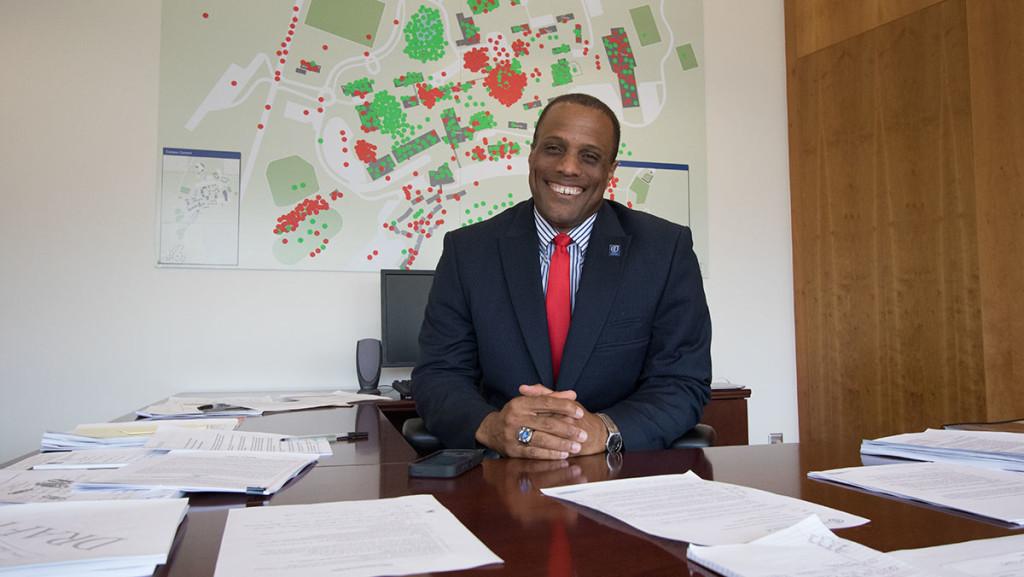Related: Ithaca College student crowdfunds tuition
Ithaca College students pay for education without parents’ help
Ithaca College is taking steps within the coming years to make the college become more affordable for students.
The institution hopes to add to the financial aid budget over the next four years by cutting staff positions across the college, using strategic sourcing and diversifying revenue sources to keep increases in tuition low, President Tom Rochon said.
The college will attempt to keep after financial-aid tuition increases just over 1 percent, as they have for the past four years, Rochon said.
Overall tuition, which does not factor in financial aid, increased from $39,532 in 2014–15 to $40,658 this year, a 2.85 percent increase, which was the lowest percentage increase in 50 years, Rochon said. This year’s budget also allocated $109 million for institutional financial aid, which was an 8 percent increase from the prior year.
Gerald Hector, vice president of finance and administration, said the college typically brings in $232 million per year from student-related revenue, which includes tuition, fees, and room and board. About $108 million of that revenue is used to provide financial aid, leaving the college with a yearly budget of about $124 million, he said. The $108 million is unfunded aid, which is provided by the school to lower the cost of students’ tuition price, Hector said. Funded aid is money given to a student from an outside source, such as a scholarship or personal donation, he said.
He said the budget of $124 million is then used holistically throughout the college on different expenses ranging from utilities to academics to professional travel. Hector said the college plans yearly spending by looking at past trends and recently developed strategic priorities.
“The objective is to ensure we’re offering a quality, high-performing education for our students, which is what they expect, but we’re also doing it in such a way that we can allow the college to be more affordable for everyone,” Hector said. “The budgets that we’re building and all the strategic priorities that we’re investigating are all geared towards that.”
One of the major aspects of this plan is to rearrange spending so that it is more efficient and effective, Hector said. The college will reevaluate how it spends money in all areas of the campus, including faculty and staff compensation and purchases, he said.
The college announced at the Aug. 20 all-college meeting it was cutting 40 staff positions during this current fiscal year after cutting 47 positions during the 2014–15 academic year, which eliminated $3.1 million from the compensation budget.
Rochon said the college is also focusing on strategic sourcing, which refers to finding price–efficient sources for the goods and services the college needs.
“Partly, that means buying in bulk instead of having a hundred different academic and administrative departments buying 10 pens at a time, and partly that means being sophisticated in our negotiations with providers of goods and services. That’s the second prong of the effort,” Rochon said.
The college is also looking to increase revenue by exploring other ways of using the campus, Hector said. Currently, the college receives most of its revenue from student-related revenue and donations, he said. Using the campus during the summer for camps or academic programs is one way they could increase revenue, Hector said.
Rochon said the college is committed through donations to doubling the endowment, which represents the money or other resources donated to the college, and the financial aid–restricted part of the endowment between 2014 and 2020.
“That will provide revenue that doesn’t come out of student pockets, but that helps cover some of the college’s expenses, a larger percentage than what is covered today by the endowment,” he said.
Some students, like freshman Benjamin Laufer, have come to realize some of the major expenses the college has, but still find themselves in the dark about much of the college’s spending.
“I never really processed, until I got my first bill a couple [of] months ago, how much it was,” Laufer said. “The fact that [the tuition] costs, anywhere, a quarter of a million dollars is kind of ridiculous. But now that I look around … it’s an expensive operation, and the tuition probably doesn’t come close to even paying for all those resources.”
One of Hector’s main focuses is keeping the community informed on financial actions the college is taking and why, he said. One of the ways he is doing this is by hosting Dollars and $ense, monthly meetings that began in January for the college community to hear a presentation from Hector and ask him any questions.
“If people are not educated and they don’t understand what is happening in the context in which it’s happening, more often than not, folks will make stuff up,” he said. “Making stuff up doesn’t help us — it causes friction, and it causes points of contention. I believe that if you’re open and you can discuss the issues and share with folks, entertain dialogue, people can then see why you’re doing what you’re doing.”








